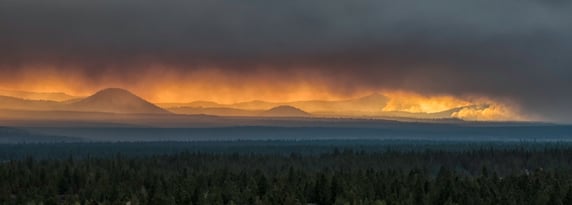And guess who the culprits were?
Teenagers.

Teenage Behavior and Brain Development
When the news broke that the fires started from the spark of mismanaged fun by teens playing with fireworks it was controversial They were throwing fireworks from the edge of a bridge in the Gorge; one boy tossed while another recorded the stunt with his smartphone.
If you remember that tragedy, discussions about the Gorge fire pivoted drastically. While the fires burned, the issue online became a debate about teenage behavior.
Teenager Brain Development Is Not an Excuse for Behavior
Children discover their role in society and parents re-discover theirs.
Family dynamics shift.
Everything from first cars to first dates changes the lifestyle that parents have spent so long building and monitoring.
It’s impossible not to change.
How the change occurs though—that’s within your realm of influence.
Being on either side of a teenager's development is life-changing.
“I'm so tired of seeing the teenage 'prefrontal lobe' excuse. My teenage son
would never think to do something like this no matter how impulsive he gets...”
That’s one reaction from the heated discussion over Columbia River Gorge’s fire tragedy mentioned above. And of course, that's easy to say when it's not your teen that ignited the fire.
Another: “The ‘schmuck’ is a teenage boy. They lack the brain wiring for judgment.”
We must arm our teenagers with life skills to navigate this difficult time.
Understanding their behavior is important. However, brain development does not relinquish a teenager's or a parent's responsibility.
In fact, the judge ordered the 15-year-old to pay $36.6 million in restitution to make a point. The boy is doing 1,920 hours in community service and serving five years probation.
Actions DO have consequences even when "we didn't mean it."
Fire damage aside, brain development linked to erratic behavior is a hot topic when it comes to teens. There are many views and opinions on whether or not teenage rebellion is "normal" and if parents need to be ready.
However, there is no getting around the massive changes a teen goes through. Adolescent puberty ushers in a time when emotions run high and teen brains are changing rapidly—daily.
The teen years are challenging for both parents and teenagers. Learning self-control is critical.
Adolescence itself is a tricky subject.
With the onset of puberty shifting earlier and earlier, researchers now estimate it can begin as early as age seven in girls and nine in boys. Stress, environmental factors, diet, obesity, and lifestyle all can play a role.
On the flip side, puberty (meaning the first, internal and unseen changes) can start as late as thirteen in girls and thirteen and a half in boys.
Development of the Teenage Brain and Pruning of Neural Synapses
As teens’ bodies change, their brains change just as notably. Studies by the National Library of Medicine shows neural pruning at the beginning of puberty:
"Onset of puberty is usually considered to coincide with the last major step in brain development: the elimination of some 40% of neuronal synapses."
The wide open potential of a child’s brain is being pruned and refined in adolescence. It is no coincidence that this is when teens craft their social identity, ethics, and habits.

During the brain development of puberty, human brains prune down existing neural pathways and build the myelin sheaths that connect neurons at an incredibly efficient rate. This is one reason researchers say adolescence is the time to pick up a language or instrument.
And it is why smartphone developers work to make their technology addicting to the teenage brain. It is also the reason so many parents worry about what habits their teen is forming.
For a deeper dive, check out Dr. Daniel Siegel's video on the teenage brain from The Dalai Lama Center below:
Provide Solid Ground for Your Teenager through Emotional Intelligence
Whether it’s a state-wide disaster or a dinner-table fight that just feels like one, it’s wise to remember that teenagers are not actually a different species. They are forging their identity and navigation a forest fire of their own! So instilling and reinforcing emotional intelligence during this time is vital.
Teenage defiance and bickering between parents and teenagers are unnecessary if we use knowledge to help us navigate this developmental stage. Physical and mental changes are playing across teen's bodies and brains, but the key to coping with them is understanding.
Coaching parents and teens for the last couple of decades, I've realized that parents take their teens WAY TOO LITERAL.
When your teen pushes you away and says they need space, that might be absolutely true for them in that moment. However, it doesn't mean forevermore!
Keep checking in.
Continue to reach out no matter how rejected you may feel.
Easier said than done, I know. YET, crucial!
Keep the relationship intact! Nurture it! Find common ground for connection.
Closing Thoughts
Without understanding, our knee-jerk reactions will spark like the blaze started in the Columbia River Gorge—exactly the opposite of what teenagers need to develop a healthy and balanced brain.
Parents and adults in a teen's life need to remember that they are the teenager's safe zone, the grounding wire!
And as parents navigate this challenging time, it's up to you to create a solid and calm place to regulate their emotions and help them consider consequences BEFORE they act.
Your positive influence DOES make a big difference even though it doesn't feel like it sometimes. Seeking to understand is crucial.
Related reading: "Teenage Rebellion, a Cry for Connection and Love."
To discover a greater joy in parenting teens, or to get support in parenting teens from a parenting coach, contact us at Heartmanity.









